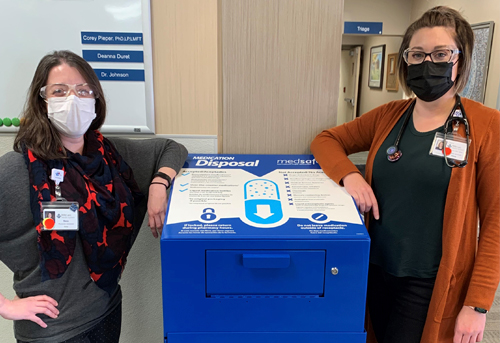Medication and needle disposal programs
November 2, 2020
Medication Take-Back Box and Needle Campaign
Mille Lacs Health System is proud to announce the start of a new campaign, in partnership with Mille Lacs County Community and Veterans Services, aimed at improving public education and awareness of needle exposure and safe disposal.
Simple and effective steps can be taken by citizens to safely remove used needles, or those found on roadsides, in parks, and in the greater community. The campaign aims to reduce risk of exposure to diseases such as HIV, Hepatitis C, and Hepatitis B, which can be transmitted via needle exposure in our communities.
Also new is a safe medication disposal station, located at the Mille Lacs Health System Onamia Clinic. Accepted medications include: prescription medications, over the counter medications, liquid medication bottles less than 4oz (in a Ziploc bag). Safe disposal and proper destruction keeps toxic medications out of the groundwater and is key to promoting community-wide health and safety. Not accepted: illegal drugs, needles/syringes/sharps containers, medical devices/batteries, aerosols/inhalers, chemicals, mercury-containing devices, chemotherapy drugs.
The medication take-back box and the needle campaign are made possible by an Opioid Overdose Prevention Grant, obtained through the MN Department of HealthToo often, unused prescription drugs find their way into the wrong hands,” said Bess Kuzma, MLHS Physician Assistant and Community Outreach Coordinator for the grant. “This can be dangerous and often tragic. That's why it’s important to clean out your medicine cabinets and turn in - safely and anonymously - prescription drugs.”
“We have worked hard to get this money since we started the Medicine Assisted Treatment program,” said MLHS Physician Assistant and treatment director Beth Twite. “We were chosen due to the increased need for treatment in our area. It will be vital to bring in much-needed resources to strengthen the programming infrastructure at MLHS by hiring needed staff for coordination of care needs.” Twite goes on to say that the patient population, being rural, has unique needs including transportation and housing, which directly affect residents’ ability to maintain sobriety when they are on that journey.
The cutters will be available at all MLHS clinics, Mille Lacs County Community and Veterans Services in Milaca, and the City Hall in Onamia. They can be used by individuals to remove needle tips off personal syringes to ensure safe disposal. The cutters are to be disposed of when they are full; in the same ways as full syringe boxes/bottles.
Together citizens can make our community clean, safe, and free of disease by reducing the risk of needle exposure,” said Kuzma. “Please join us in our efforts. The campaign will run through the end of November. If you have questions, please call 320-532-2656.
Follow the following simple steps to safely dispose of needles/syringes you find in your neighborhoods:
- DO NOT pick up needles or syringes with your bare hands. Use a glove and tongs, shovel, or broom and dustpan.
- Place used sharps and syringes, SHARP END DOWN, in a manufactured sharps container (purchase at pharmacies) or a laundry detergent jug/thick plastic container. DO NOT HOLD THE CONTAINER IN YOUR HAND AS YOU DEPOSIT NEEDLES. Place the jug on the ground or a tabletop – this will avoid accidently dropping a needle onto an exposed hand.
- Make sure the lid fits tightly and tape it shut. Label it: "HOUSEHOLD SHARPS, DO NOT RECYCLE."
- Dispose of the bottle once it reaches the ½ full mark.
- While it is all right to put sharps directly into the garbage, for safety reasons it is strongly discouraged. Contact your waste disposal service provider for more information.
What to Do If You Are Accidently Stuck by a Used Needle or Other Sharp
If you are accidently stuck by another person’s used needle or other sharp:
- Wash the exposed area right away with water and soap or use a skin disinfectant (antiseptic) such as rubbing alcohol or hand sanitizer.
- Seek immediate medical attention by calling your medical provider or local hospital.
Follow these same instructions if you get blood or other bodily fluids in your eyes, nose, mouth, or on your skin.
#
